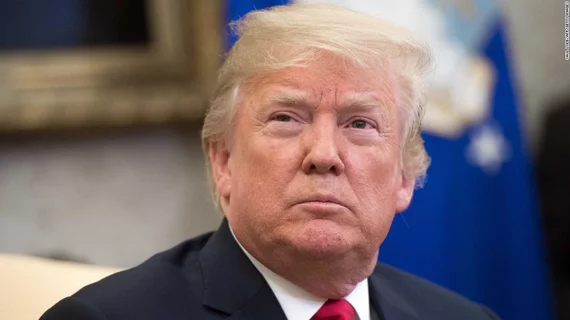Trump signs new opioid bills, introduces rule to lower drug prices
A package of opioid bills was signed into law Wednesday by President Trump in a broad effort to wrangle the opioid abuse epidemic, which claimed 72,000 lives in overdose-related deaths last year. The president also proposed making major changes to Medicare drug pricing on Thursday.
The legislation, Support for Patients and Communities Act, was approved by Congress in early October with wide bipartisan support. It comes at time when the opioid crisis may have reached a peak, according to HHS Secretary Alex Azar, who spoke of “encouraging” results in overdose trends this week, NPR reported.
The 660-page bill advances several treatment and recovery efforts, partly by lifting some Medicaid and Medicare restrictions. Among the numerous provisions, CMS is to establish a demonstration project to increase provider treatment for substance-abuse disorders. The FDA is similarly directed to issue or update guidance on non-addictive treatment for pain and addiction.
The bill expands the abilities of healthcare professionals to prescribe buprenorphine, which can treat pain and narcotic addiction. Substance-abuse disorder telehealth services restrictions were relaxed, while new Medicare enrollees will undergo an opioid-use disorder screening and prescription history review in initial examinations.
The bill does not specifically increase funding to address the national problem, according to Vox.
New drug pricing rule
Outside of the opioid packages, President Trump announced an advanced notice of a new proposal Thursday afternoon while speaking at HHS that specifically aims to lower prescription drug prices by closing loopholes that make medicines cheaper overseas. Currently, Medicare pays 180 percent of what “other wealthy countries pay” for the highest cost physician-administered drugs, according to CMS.
“For decades, other countries have rigged the system so American patients are charged… sometimes much, much more for the exact same drug,” Trump said Thursday.
The rule takes aim at the “global freeloading” of other countries and will ensure the rest of the world stops reaping “the benefit of Americans,” he said. The president has been tough in his words that he will lower drug prices, and the administration released a blueprint in May that outlined ideas to achieve lower prices.
CMS says it will lower prices by testing three changes through the Center for Medicare & Medicaid Innovation (CMMI). The fully implemented model, the International Pricing Index, will drop payment for drugs 30 percent, according to CMS.
Specifically, CMS will test “phasing down the Medicare payment amount” for certain Medicare Part B drugs that are more in line with international prices; allowing private-sector vendors to negotiate drug prices and compete for physician and pharmacy business; and change the 4.3 percent drug add-on payment to 6 percent of historical drug costs.
The proposal would also pay doctors a “flat fee” for prescribing medicines, independent of pricing, according to Trump.
Medicare will set the payment for drugs at a target price of 126 percent of the average price other countries pay for the drug.
CMS estimates patients and American taxpayers will save $17.2 billion over five years as the model is phased in, including $3.4 billion in out-of-pocket savings. The model would apply to 50 percent of the country and cover most drugs on Medicare Part B, which includes physician-administered medicines.
CMS will likely issue a proposed rule in the spring of 2019, the agency stated. It will accept comments on the notice until Dec. 24.
Industry support for opioids
On Tuesday, CMS also introduced the Maternal Opioid Misuse (MOM) model, which addresses pregnant and postpartum Medicaid beneficiaries with opioid use disorder. Medicaid pays the majority of the $1.5 billion annual cost of neonatal abstinence syndrome (NAS) and the largest portion of hospital charges for maternal substance use.
The model will support care coordination and integrate other services for health, well-being and recovery, according to CMS. CMMI will execute 12 agreements with states to implement the MOM model with $64.5 million in funding over a five-year period.
Several major healthcare companies voiced their support for the package of opioid bills, with 21 organizations, including Amazon, Blue Cross Blue Shield Association, Cigna, CVS Health, Facebook, Google and more, pledging various commitments to help combat the crisis.
“The broad bipartisan support reflects that the opioid epidemic knows no geographic, political or socio-economic boundaries; it does not discriminate among the American lives it continues to claim,” health services company Cigna said in a statement. “Cigna believes only through supporting and treating the whole person––with the mind and body treated as one––can we begin to heal this epidemic and prevent future ones from starting.”
The broad support from organizations encompassed various products and services.
“Amazon will help first responders more efficiently access critical medical records and has programmed Alexa voice service to answer important questions about opioids and addiction,” Brian Huseman, vice president of public policy at Amazon, said in a statement.
Blue Cross Blue Shield Association promised to launch centers for substance use treatment and recovery as well as a toll-free national hotline to help Americans locate treatment centers.
CVS Health announced it will install 1,100 additional permanent medication disposal units in communities, including in CVS Pharmacy locations and local police stations. The company also committed to reaching an additional 250,000 students and parents with its opioid abuse prevention education program called Pharmacists Teach, which will reach 650,000 by the end of next year.
However, other experts said the bill doesn’t go far enough.
Leana Wen, MD, former Baltimore health commissioner and the incoming president of Planned Parenthood, told Vox the bill is only “tinkering around the edges” of the crisis.

